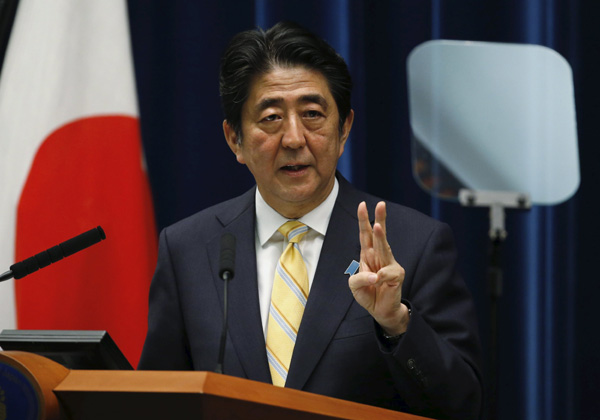Abe still playing his games over history
Updated: 2015-05-22 07:44
(China Daily)
|
|||||||||||
 |
|
Japan's Prime Minister Shinzo Abe gestures as he speaks during a news conference at his official residence in Tokyo May 14, 2015. [Photo/Agencies] |
Japanese Prime Minister Shinzo Abe's refusal to recognize part of the Potsdam Proclamation not only marks his latest attempt to gloss over Japan's history of aggression, it also poses a challenge to the post-World War II international order.
On Wednesday, when asked to comment on the Potsdam Proclamation which clearly says the war Japan waged falls into the category of aggression that aimed at occupying the world, Abe claimed he did not know this part of the proclamation and so refused to comment on it.
The Japanese leader even went further to say that accepting the proclamation was a way that Japan ended the war.
For those in the West who accuse countries such as China and the Republic of Korea of being unforgiving of the Japanese aggression prior to and during the war, Abe's remarks should prompt them to change their mind.
Although the world is familiar with Abe's repeated denials of history, his self-declared ignorance of an international treaty that directly concerns his country and which is deemed a cornerstone of the postwar international order should ring the alarm bells for all peace-loving people around the world.
Abe should be told whether he recognizes it or not, the document remains intact.
We emphasize history because history, as a mirror, constantly reminds us that peace is hard won and we should strive to hold on to it forever.
Abe's twisted perspective on history not only tarnishes Japan's image, it is also leading the country down a dangerous path.
What lies behind Abe's continuous denials of historical truths and his blinkered approach to this dark period in his country's history is simple: He needs to appeal to right-wing conservative voters so he can keep his hand on the helm of the ship of state.
Abe is obviously chasing his own interests at the expense of the whole nation. The consequences of Abe's revisionist policy are potentially severe: Japan is under unprecedented pressure from both the region and the entire world to squarely face up to its past, and the island country's ties with China and the ROK are at their lowest point for years.
True, there have been signs lately that Abe wants to mend fences with China. But his staging one farce after another only serves to undermine the efforts of both sides to improve bilateral ties. If he continues trying to whitewash history, sooner or later Abe will reap what he has sown.
Related Stories
Abe's denial of Potsdam Proclamation no good for Japan's image 2015-05-21 16:00
Abe's cabinet approves draft security bills for greater SDF role 2015-05-15 08:56
If Abe could only say sorry 2015-05-09 08:32
Park calls for apology from Abe 2015-05-05 07:56
Today's Top News
Premier Li urges harnessing China's manufacturing prowess
OPEC turn down Chinese requests for extra oil
Beijing concerned as US accuses 6 Chinese of economic spying
Ma backs female entrepreneurs
China, Brazil launch new era of economic relations
China jumps 28 positions in global tourism competitiveness ranking
Xiaomi debuts in US, Europe with online store
Milan Expo highlights need to ensure healthy, safe, sufficient food for all
Hot Topics
Lunar probe , China growth forecasts, Emission rules get tougher, China seen through 'colored lens', International board,
Editor's Picks

|

|

|

|

|

|






